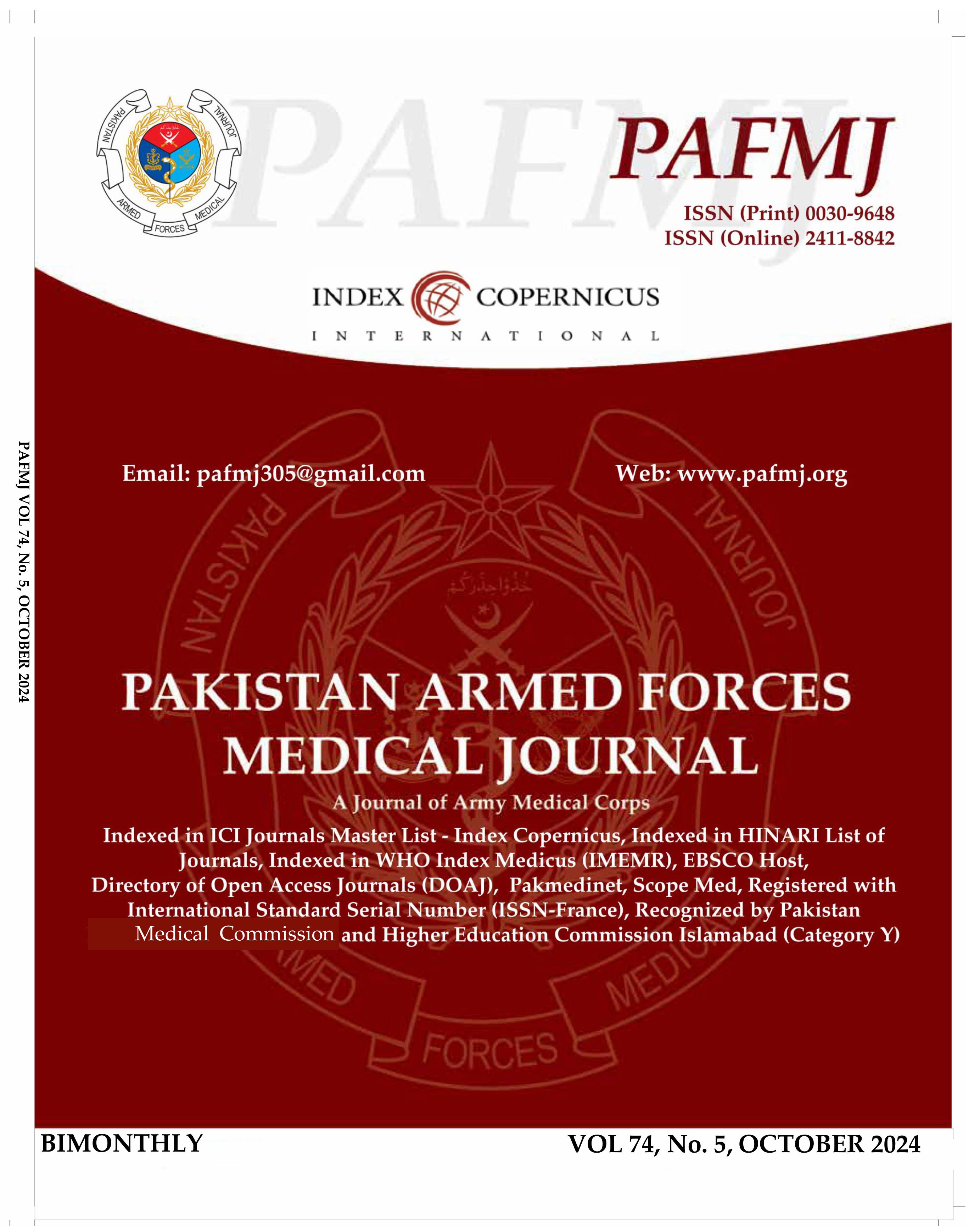Clinico-Dermoscopic Consensus in Patients of Scabies presenting in a Tertiary Care Hospital
DOI:
https://doi.org/10.51253/pafmj.v74i5.10384Keywords:
Dermoscopy, Pruritus, ScabiesAbstract
Objective: To determine the concordance between clinical and dermoscopic findings in patients of scabies.
Study Design: Cross-Sectional Study.
Place and Duration of Study: Dermatology Department, PNS Shifa Hospital, Karachi Pakistan, from Jun 2022-Dec 2022.
Methodology: All patients visiting Dermatology Outpatient during the study period with history of itching and age ranging from 18-50 years of either gender were included in this study after obtaining prior informed consent. Dermoscopic findings were recorded using HIEINE DELTA 20T dermoscope, captured at 10-16x magnification under standardized conditions of color and light, and stored using a 40-megapixel mobile camera for further investigation.
Results: The age of patients ranged from 18 to 50 years with a median of 28.0(10.0). In the distribution of gender, 119(69.6%) were male while 52(30.4%) were female. Concordance between clinical and dermoscopic findings was noted in 91 patients (53.21%).
Conclusion: Insignificant concordance was noted between clinical and dermoscopic findings among clinically suspicious patients of scabies.
Downloads
References
Who.int. 2022. Scabies. [Internet] Available at:
https://www.who.invnews room/fact-sheets/detail/scabies
(Accessed on December 11, 2022)
Anderson KL, Strowd LC. Epidemiology, diagnosis, and treatment of scabies in a dermatology office. J Am Board Fam Med 2017; 30(1): 78–84.
Abdel-Latif AA, Elshahed AR, Salama OA, Elsaie ML. Comparing the diagnostic properties of skin scraping, adhesive tape, and dermoscopy in diagnosing scabies. Acta Dermatovenerol Alp Pannonica Adriat 2018; 27(2): 75-78.
Dupuy A, Dehen L, Bourrat E, Lacroix C, Benderdouche M, Dubertret L, Morel P, Feuilhade de Chauvin M, Petit A. Accuracy of standard dermoscopy for diagnosing scabies. J Am Acad Dermatol; 56(1): 53-62.
https://doi.org/10.1016/j.jaad.2006.07.025
Prins C, Stucki L, French L, Saurat JH, Braun RP. Dermoscopy for the in vivo detection of Sarcoptes scabiei. Dermatology 2004; 208: 241–243.
Neynaber S, Wolff H. Diagnosis of scabies with dermoscopy. Can Med Assoc J 2008; 178(12): 1540-1541.
https://doi.org/10.1503/cmaj.061753
Argenziano G, Fabbrocini G, Delfino M. Epiluminescence microscopy. A new approach to in vivo detection of Sarcoptes scabiei. Arch Dermatol 1997; 133(6): 751-753.
https://doi.org/10.1001/archderm.133.6.751
Scanni G. The Mite-Gallery Unit: A New Concept for Describing Scabies through entodermoscopy. Trop Med Infect Dis 2019; 4(48).
Cinotti E, Perrot JL, Labeille B, Cambazard F. Diagnosis of scabies by high magnification dermoscopy: the "delta-wing jet,' appearance of Sarcoptes scabiei. Ann Dermatol Venereol. 2013; 140(11): 722-73.
Kafayat N, Fahad A, Malik LM, Azfar NA. Degree of agreement between clinical diagnosis and dermoscopy in scabies. J Pak Assoc Dermatol 2019; 29(3): 328-333.
Kaliyadan F. The scope of the dermoscope. Indian Dermatol Online J 2016; 7(5): 359-363.
Rosendahl C. Dermatoscopy in general practice. Br J Dermatol. 2016; 175(4): 673-674.
Fox G. Diagnosis of scabies by dermoscopy. BMJ Case Rep 2009; 10: 1136. https://doi.org/10.1136/bcr.06.2008.0279
Walter B, Heukelbach J, Fengler G, Worth C, Hengge U, Feldmeier H. comparison of dermoscopy, skin scrapings and the adhesive tape test for the diagnoses of scabies in a resource-poor setting. Arch DermatoI 2011; 147(4): 468-473.
Park JH, Kim CW, Kim SS. The diagnostic accuracy of dermoscopy for scabies. Ann Dermatol 2012;24(2):194-199.
Li FZ, Chen S. Diagnostic Accuracy of Dermoscopy for Scabies. Korean J Parasitol. 2020 Dec; 58(6): 669-674.
https://doi.org/10.3347/kjp.2020.58.6.669.
Nie YL, Yi H, Xie XY, Fu GL, Zheng YQ. Dermoscopic features of children scabies. Front Med 2023; 10: 1097999.
https://doi.org/10.3389/fmed.2023.1097999
Errichetti E, Stinco G. Dermoscopy in general dermatology: a practical overview. Dermatol Ther 2016; 6(4): 471-507.
Engelman D, Yoshizumi J, Hay RJ, Osti M, Micali G, Norton S, et al. The 2020 International Alliance for the Control of Scabies Consensus Criteria for the Diagnosis of Scabies. Br J Dermatol 2020 Nov; 183(5): 808-820.
https://doi.org/10.1111/bjd.18943
Hicks MI, Elston DM. Scabies. Dermatol Ther 2009; 22(4): 279-292.
Downloads
Published
Issue
Section
License
Copyright (c) 2024 Muhammad Umair, Tariq Malik, Najia Ahmed, Arfan ul Bari, Fatima Hasan, Hafiz Muhammad Fahad

This work is licensed under a Creative Commons Attribution-NonCommercial 4.0 International License.















